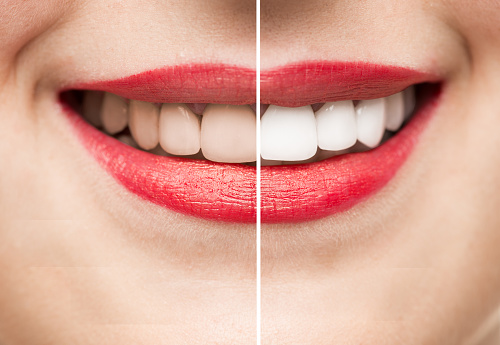Teeth Whitening
WHAT IS TEETH WHITENING?
Teeth whitening is a process of removing stains from the tooth surface and restoring the natural color of the teeth. Whitening is a one-time procedure performed by a dentist. It is amongst the most common and widely adopted cosmetic procedure. With the advent of the latest Dental technology, we have advanced whitening treatment procedures which give reliable and long-lasting results.
For better results do get it done from a trained dental professional at our hospital.
WHAT IS THE NEED FOR TEETH WHITENING?
The enamel which reflects the natural color of your tooth can stain or dentin which is the inner surface of teeth stains and yellows the teeth. The causes of tooth discoloration are varied. Though many causes can be prevented yet there are some which are not in control.

The causes of discoloration are:
- Consuming tea, coffee, wine, cola frequently
- Smoking cigarettes and chewing tobacco
- High intake of fluoride during childhood
- Damage of developing permanent teeth due to accident or trauma
- Aging can also contribute to staining of teeth as with age the enamel gets thinner exposing the dentin below. With age, the dentin come in contact with certain food and beverage and can stain your teeth
- Certain medical treatments can also contribute to staining of teeth
The process of Teeth Whitening clears the stain and make your teeth look whiter. However, one should keep in mind that the results may vary from person to person.
Who should get their teeth whitened?
Depictions of pearly white teeth on TV or in magazines have made it seem like a spotless, perfect smile is the norm. But no matter what your teeth look like, there’s no reason to ever be ashamed of your smile. You should prioritize the health of your teeth above cosmetic appearances.
Tooth yellowing can occur due to:
- Aging
- Genetic predisposition
- Certain medications (such as tetracycline)
- Lifestyle habits (including drinking coffee or soda and smoking)
People who have dental implants or veneers are not candidates for teeth whitening. Teeth whitening works on natural teeth only. Many younger people in recent years have pursued veneers to achieve a perfectly white smile, but this can be dangerous for your teeth’s health in the long run.
If you are self-conscious about your smile because of teeth yellowing and you have your natural teeth, you might want to try teeth whitening methods. But ultimately this is a personal aesthetic choice and not a medical necessity.
Consult with your dentist about what whitening options may be best for you. Always read directions on home kits and use products as directed.
It’s important to note that people with dental implants, veneers, crowns, or bridges might not be candidates for teeth whitening, depending on the location of this dental work. If it is in the back of the mouth, a person may still receive whitening. If is in the front of the mouth, whitening is not recommended
HOW DOES TEETH WHITENING WORKS?
Your dentist will first photograph your teeth which will help to know the progress of the treatment. This is also used to examine your tooth and figure out the stains.
After examining the tooth dentist will start by cleaning the tooth. He will remove the film on your enamel coated due to the food you eat or due to other substances. The whitening process begins after this. The entire process takes around 30-90 mins depending upon the severity of the stains on teeth.
Your dentist will cover the gums and will then apply the whitening agent on teeth. Some whitening agents require laser lights on them and if your teeth are badly stained then your dentist will suggest you continue the process at home for a few days.
You can also opt for home whitening treatment, in this, your dentist will take an impression of your teeth and will make a custom fit mouthpiece. This helps the whitening agent to stay intact on your teeth.
One can also buy over the counter whitening products which is suitable only for the teeth which are not heavily stained.
Teeth whitening side effects
The most common side effect of teeth whitening is temporary tooth sensitivity. Mouth and gum irritation is also common. Hydrogen peroxide especially can cause this reaction.
When you get your teeth whitened at the dentist’s office, your gum tissue will be protected during the treatment to reduce this side effect.
